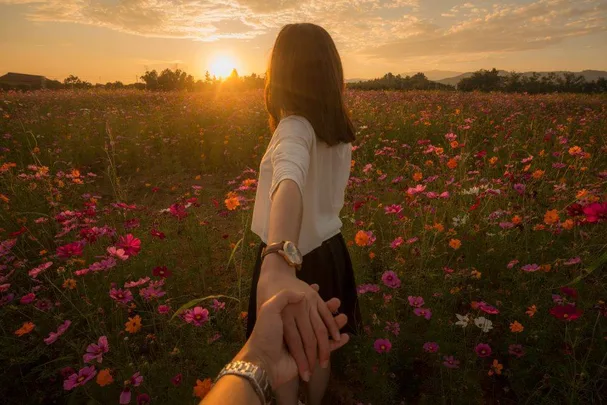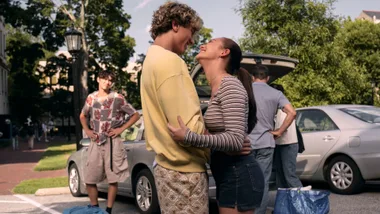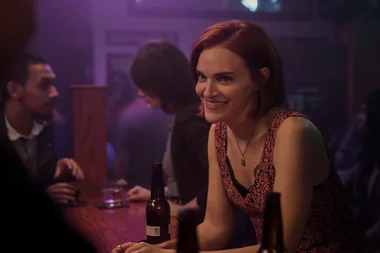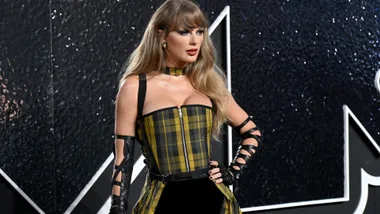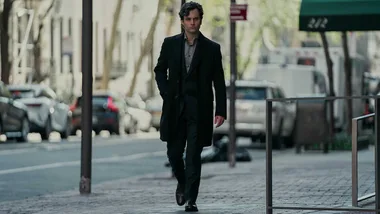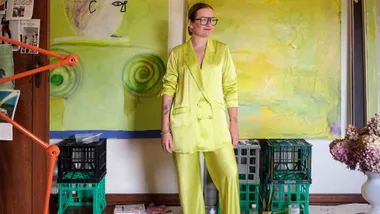I fell in love this year. It’s been the absolute best experience, and the absolute worst. The best, because I’ve met someone who I laugh with, supports me when I’m down, likes to eat Domino’s pizza and watch every Fast and the Furious movie for an entire Saturday, and can both sit and read a book with me in a park or go get day-drunk at the pub together. It’s been easy.
Except when it hasn’t been easy. I’ve had crippling anxiety around every step toward deeper intimacy, an anxiety that can overwhelm me and make me feel trapped in the relationship. I have weekends where I just want to be alone, periods where he annoys me and times I don’t want to have sex for whatever reason.
In past relationships, my anxiety would latch onto these moments. “He’s not right for you” it would scream. Then, the comparison creeps in. “Go look at couples on Instagram, that’s how it’s meant to be” anxiety would whisper, and I’d start scrolling – famous couples. Instagram couples. Friends of friends. Industry people I follow who have just had babies, posting sepia-toned family pictures, wedding photos, engagements – portraits of blissful happiness. “My loves” these photos are captioned. “Happy birthday to my best friend, the light of my life, my perfect partner”. “There’s nowhere else I’d rather be than by your side, baby”.
Instagram has long been the single most damaging intruder on my romantic relationships. I have acute comparison syndrome in general, but especially when it comes to love. I take social media, celebrity interviews, and reality TV very literally. For example, I spent years in my twenties believing love should be so all-encompassing, you couldn’t function properly. That love was explosively powerful and overwhelmed you. It’s what people say, isn’t it? Just like good sex makes you “see stars”.
Many years ago I actually Googled the scientific definition of an orgasm. After spending my entire life thinking I’d never had one, because I’d never seen stars, blacked out, anything like that, I realised I’d been having them all along – I’d just bought into the poetic way people describe sex, taking these flowery descriptions as blanket fact. The same goes with love – I always thought love was a feeling that was only real if it took over your whole life, but I now believe – especially when you have a wonderful, rich life filled with friends, family, travel and other things you love – that romantic love is another wonderful experience – it can be at times all-consuming, but it won’t necessarily dominate your existence.
Still, I struggle when we struggle. Or, as it often is, when I have anxious thoughts about the relationship, I fall into the trap of comparing ours with other peoples. Always, we come up short. Everyone on Instagram seems to be so deeply, consumingly in love – so effortlessly happy at all times, so confident in their relationships and cruising at a permanently high altitude. Where are the ups and downs? These people clearly don’t wake up some days and question their feelings, or whether they want to spend less time with their partner. These people seem like they would never go to bed without having sex, they would simply have to rip their partners clothes off, so deep is their physical attraction to each other. These people wouldn’t panic about commitment, they simply know deep in their souls that they are connected for life. Right?
Instagram makes me feel like everyone is living in a permanent state of euphoric, stable, eternal love – and I am defective.
Thankfully, I have found people in my life who will be honest with me about their relationships, and that honesty is invaluable to me. An old friend whose relationship from the outside looked effortless once told me long-term love involves constant ebbs and flows – some months she would feel deeply connected to her partner, while he was distant. Other times, they were both back in a smitten place and couldn’t get enough of each other. “The hardest is when you both feel disconnected,” she told me, saying that’s when you really have to dig your heels in and commit to riding it through.
Another friend pragmatically put falling in love with her now-husband this way. “I knew he was right for me simply because he would stick around and work on our issues,” she said, adding that it wasn’t a fireworks experience or anything wild, just a grounded man she connected with, was attracted to, enjoyed her time with – and who wasn’t afraid of hard work.
Rikki, an industry friend I’ve remained in touch with for years, has always been refreshingly honest about her relationship – and friendships, for that matter. “I’ve never been a flowery person about relationships or friendships. I like the grit of it. I hate hyperbole if I’m not genuinely feeling it,” she said.
“I think that maybe with socials we have set the bar very low for ‘perfect’ and then mentally built on this unstable, flimsy foundation,” she added when I asked her what she thinks of the whole thing. “A nice pic at golden hour of a tanned dude kissing his ethereal girlfriend in the back of a van is the foundation for how people are seeing a whole relationship.”
As she added – what happens after that photo?
“He farts, she has a urinary tract infection… One that she’ll probably share to bring awareness to, but she won’t say that the other day Beau-with-the-man-bun made a really bloody hurtful comment the other night and she’s not quite over it. Maybe it meant something big, maybe it didn’t. It’s messy.”
It’s not like comparing our love to other loves is new. As Rikki says, we’ve been doing this forever – just not with real-life couples. “Fairy tales, rom coms, Sex and the f*cking City for christ’s sake,” she added.
It does seem louder these days, though. As Rikki said to me, TV shows often get real at the end of an episode. Carrie might have a whirlwind romance with Big, but they also had their fair share of realistic problems, from commitment-phobia to the realities of moving in together. On Instagram, we rarely – if ever – share these moments with followers.
My friend Josie has been with her partner for ten years, but is always the first to give me a reality check when I bring up my relationship insecurities with her – she’s honest about the ups and downs. She recently had her first child and tells me the social media bullshit gets even worse around parenting.
“When I had a baby and spent hours scrolling through Instagram I found it to be quite a toxic place to be. I would start to see what other mum friends were posting, mostly humblebrags like: “All she does is say ‘Mum’!” and “Wow look at little Jack on the move already!”. It just made me (and by extension, my own baby) feel inadequate,” she said.
“But then when I hung out with those friends in real life I realised they were actually having a tough time — an unsupportive partner, feelings of insecurity as a new mum, some crazy hormones going on, zero sleep whatsoever — and were using Instagram to hide all of that by making everything look perfect.”
So if we’re all actually not in hyper-perfect relationships, or raising perfect children with perfect life partners – why are we all pretending we are?
It’s natural to share our highs with each other. I truly believe, for the most part, that we’re sharing our happy moments because we genuinely feel happy in that moment, and want to shout it from the rooftops.
But these days, it sometimes feels like people (including me, I’ll admit) aren’t always sharing highs to connect with friends and family, we’re doing it to position ourselves as better-than, more-than. Even if you can genuinely say your content-sharing is always about wanting to share, not wanting to brag, you have to admit there’s a curation that happens where we want to present our very best self on the grid.
Maybe it’s time we re-assess that.
“I’m all for sharing cute baby content, but keep it real too. People need to see the highs and the lows. It can be really damaging otherwise,” Josie says to me.
I for one have really enjoyed following the “keeping it real” influencers like Celeste Barber, Chantelle Otten, Flex Mami – people who don’t present glossy, picture-perfect lives but who often acknowledge the gritty realness of relationships and general life. Their refreshingly honest accounts make me feel good about myself, not because I then consider my life better than theirs, but because I relate to their experiences and feelings. The “we’re all just working this shit out together” content makes me feel empowered, not inadequate.
I suppose no one is obligated to “be real” on social media. Sharing the lows in our lives is scary, and being that vulnerable isn’t easy – nor should anyone feel pressure to share anything they’re uncomfortable with. But I personally am re-assessing how I present my relationships on Instagram, especially my romantic relationship. I want to be more transparent because I want people to feel okay about their own not-so-amazing times, in the same way I find relief when reading or seeing other people get real about their relationships.
And is it also simply on us to disengage from something that is toxic for us? After all, there may be people reading this who remain unaffected by the hyper-positivity of social media. If you’re more like me, another helpful strategy I’ve adopted is muting people whose content makes me anxious or feel less-than. Even if it’s temporarily, while I’m going through a bad patch, I’ve found removing the images from my feed disconnects me from that constant barrage of insecurity.
I like to think that one day I’ll just delete Instagram and with it, the anxieties this barrage of positive content adds to my life. Or maybe this trend of realistic sharing from influential people will spread to the masses, and we’ll see everyday people move from presenting perfect existences to presenting a mix of highs and lows.
For now, though, I’ll continue to seek out those who will give me the full picture, and share my full picture with others, too.
